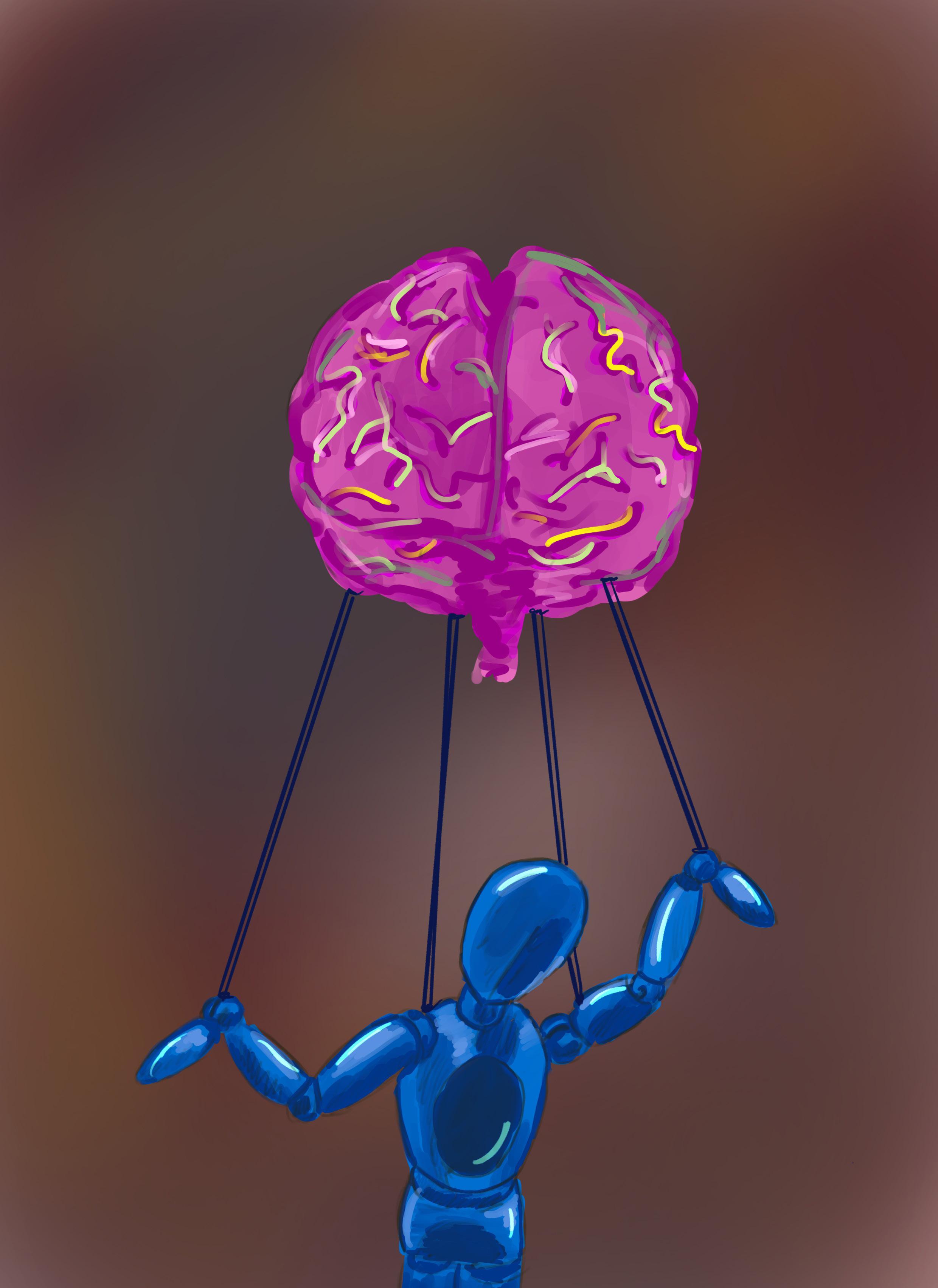looking at the world by hailey kopp


depression /di- ’ pre-shen/ noun.
A common and serious medical illness that negatively affects how you feel, the way you think and how you act.
1
(American Psychiatry Association) a neurochemical hypothesis of

depression as disempowerment & oppression
“Women of Color, aside from dealing with other forms of oppression and dispossession (not just sexism), engage in an internal process of negotiating and discovering which part of their identity has been devalued to decide what coping strategy from our toolbox needs to be used to counter the effects of said prejudicial treatment” (Mejia 2019: 248)
Experiences of depression are intimately tied to intersecting societal identities. One’s mental suffering is often attributed to biological understandings, which are upheld by psychopharmaceutical practices. Chemical imbalances and predetermined genetics are blamed for depression; however, this act pathologizes women’s bodies and minds. Pharmaceutical drug technologies offer temporary corrections while the root cause of an individual’s suffering remains. Mejia’s autoethnography calls for a shift from a biological understanding to an intersectional, social understanding of mental suffering. The oppression and discrimination women of color face strip them of their dignity and self-respect and can manifest themselves in an individual as depression.
3
“
Are (some)bodies or (some)psyches worth more than others? We are often too busy surviving to ask these questions and to learn the reasons why we are not allowed the opportunity to flourish, and we are not seen as deserving of being rescued. But how are we to survive if we can’t count on anybody?” (Mejia 2019: 249) 4

a (psychotropic) war against freedom
cheer up
In response to mental suffering, psychopharmaceuticals are prescribed to soothe and ease one’s pain. The pain one experiences is thought to be maladaptive.
“maladaptive though processing styles that need to be replaced with ‘healthier’ and more rational ones, or emotional reactions that need to be better controlled” (Mejia 2019: 250)
isn’t it about time you get over it?
…you’re being so dramatic
it’s all in your head
don’t be selfish
depression is anti-American
are you American enough?
5

captive America
“These institutions diminish the identities of the individuals within them, restructure their social roles and identities, and make them unfit for the outside world through a series of rituals enacted through admission, treatment, and social interactions with staff” (Hatch 2019: 8)
Hatch offers a critical investigation into the use of psychotropic drugs to pacify and control inmates, particularly those of minority communities. Black and Brown bodies, minds, individuals are devalued, deemed as less than, and are categorized as ‘Other’ in the United States. Psychotropic drugs are weaponized against the American ‘Other’, controlling the ways certain individuals get to exist in society. Silenced, numbed, and manipulated for a greater, American, capitalistic agenda.
Your anger ! , fear ! , sadness ! , pain ! – is unproductive. Take responsibility for your thoughts, and fix yourself.
“She wanted me to let go of my anger. What?! But anger is the only tool I have to survive” (Mejia 2019: 251)
7



(recentering) agency
“This vision was a small revelation. I realized that most thoughts are impersonal happenings, like self-assembling machines. Unless we train ourselves, the thoughts passing through our mind have little involvement with our will. It is strange to realize that even our own thoughts pass by like scenery out the window of a bus, a bus we took by accident while trying to get somewhere else. Most of the time, thinking is an autonomous process, something that happens outside of our control” (Pinchbeck 2002: 140)
Thoughts can and do define our sense of self, our individuality, our character. If we have no control over our thoughts, do we have control over who we become? Who has control? Technology, like drug technologies, can reconfigure our brain and body chemistry in ways that can transform our perception and experience of society. An individual’s agency over their experience of society is undoubtedly influenced by technology. Understanding how technology can shape our thoughts, and our behaviors, can offer us a new sense of power over the ways in which we choose to interact with society.

10
Shaping identity, forming one’s thoughts through datafication.
Discriminatory practices are further designed in datafication, also exposing how technology can disrupt and impact one’s agency.
agency through (de)colonialism
“Data colonialism, a process that normalizes the exploitation of human beings through data” (Milan & Trere 2019: 322)

“the main problem with data universalism is that it is asocial and ahistorical, presenting technology as something operating outside of history and of specific sociopolitical, cultural, and economic contexts” (Milan & Trere 2019: 325)
Datafication occurs within power structures that reproduces, intensifies, and maintains power inequalities. Individuals everyday social life becomes incorporated into capitalism through datafication.
Historically, colonialism shapes and reshapes how individuals view and understand themselves and others, taking away their agency. In order to make sense of the impacts of colonialism on an individual and their relationship to society, a critical consciousness and decolonial framework must be developed.
11
“a decolonial program should coexist with a constituting movement of holistic conceptual and methodological alternatives within a prefigurative agenda” (Milan & Trere 2019: 327)

Agency can be reclaimed and identities can be redefined. . .
“imaginaries have the ability to embed and embody prefigurative realities capable of producing change” (Milan & Trere 2019: 329)
12


technology as symptom, depression as cure
Our cultural dream of abandonment and disembodiment reveals itself through technoscientific productions. Destruction is entangled between the individuals, communities, nature, and artificial technoproductions that involuntarily inherit this dream. As prior explorations have revealed, agency can be recentered in the self through disruption and disturbance. The symptoms of technology—oppression, destruction, devalorization—manifest themselves in the body as a cure: depression. a call to return
home
“Depression is a call home and in our lives we would resist that call, because having already resisted the knowledge it would give us, it is forced to appear as alien to our lives” (Romanyshyn 1989: 224)
“Depression as a cure entails a willingness to allow oneself to be guided and to be taught by one’s depression, to work with it and to let it work over one’s life. For a life on the run and on the way up, it means specifically a willingness to allow the depression to slow you down and bring you down, and to turn you around and to demand that you remember home even as you leave it” (Romanyshyn 1989: 225) 15

“neither can be denied” by Hailey Kopp
Works Cited
Hatch, Anthony. “Incarcerating Bodies and Brains.” Silent Cells: The Secret Drugging of Captive America, U Minnesota Press, 2019, pp. 7-27.
Mejia, Angie. “Joven, Extrajera, y Deprimida en América: Ruminations of an Immigrant to Prozac Nation.” Cultural Studies ↔ Critical Methodologies, vol. 19, no. 4, 2019, pp. 243–255.
Milan, Stefania and Emiliano Trere, “Big Data from the South(s): Beyond Data
Universalism.” Television and New Media, vol. 20, no. 4, 2019, pp. 319–335.
Pinchbeck, David. Breaking Open the Head: A Psychedelic Journey into the Heart of Contemporary Shamanism, NY: Broadway Books, 2002, pp. 137–167.
Romanyshyn, Robert. “Chapter 7 ‘Re-entry: Paths of Return.’” Technology as Symptom and Dream, Routledge, 1989, pp. 199–229.




















